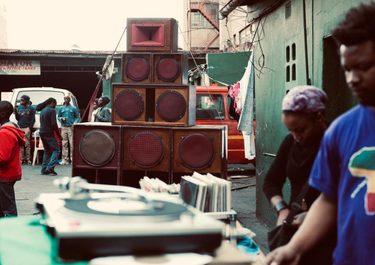
Sound System Culture at ADE's Saturday: music for a better world
words by Joshua Broadley
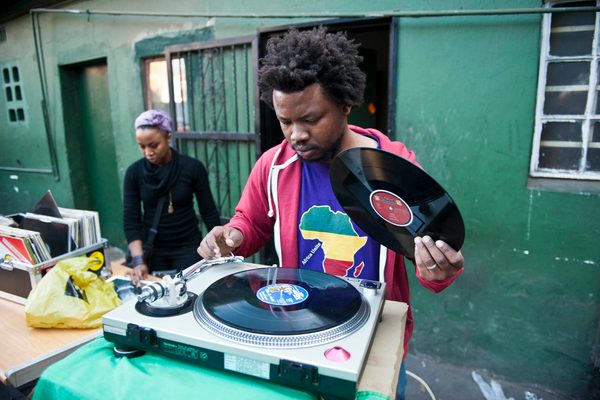
Kebra Ethiopia: Sound as survival and resistance
For two decades, Kebra Ethiopia Sound System, founded by Lekentle Mohlala, has embodied this spirit. Born in the shadow of Apartheid’s restrictions on gatherings, Kebra Ethiopia became a defiant space in Johannesburg, South-Africa for connection and resilience. Despite ongoing battles with poverty and systemic challenges, Lekentle has kept his sound alive. Fuelled, as he says, by reggae itself: 'Many are people who might be in trouble: criminals, or struggling with substances. When they come to my sessions however, they feel at home. They don’t need to solve everything at once.'
He explains how they become part of the community. They see people like them, understand it’s not personal, but the system. Lekentle Mohlala: 'We are all in the same struggle. And that helps them choose a better path.'
He chooses to remain in the area that needs it most rather than re-locating, prioritising organic growth and community care over the promise of bigger audiences or greater financial reward elsewhere. For Lekentle, the decision is not just practical, but deeply political: a commitment to making music a resource for the people around him.
'We keep our base here by choice. Because for us, reggae and sound system are resources for those who are disadvantaged. Uptown, sure, we could do better, but it wouldn’t serve the same purpose. Here, it brings people together.'
'Suffering looks different, but music accommodates everyone'
In a community where people have to choose between food and entertainment, he makes the gathering into a place where you don’t have to choose, providing food for those who need it, and providing the sound to help people connect. On ADE Thursday at Garage Noord, Mohlala will step into new territory, performing on the Dutch Covenant Sound system in an enclosed venue, a stark contrast to the outdoor sessions he is used to hosting back home. For him, the shift in setting doesn’t change the mission: 'I’ve seen it everywhere - Brazil, Europe - suffering looks different, but music accommodates everyone. It welcomes everyone.'
Then, on Saturday at Felix Meritis, he will speak alongside Ethel Leka and others, presenting a short film exploring his past, and discuss how sound systems serve as tools of resistance, shaping both local communities and the global music landscape.
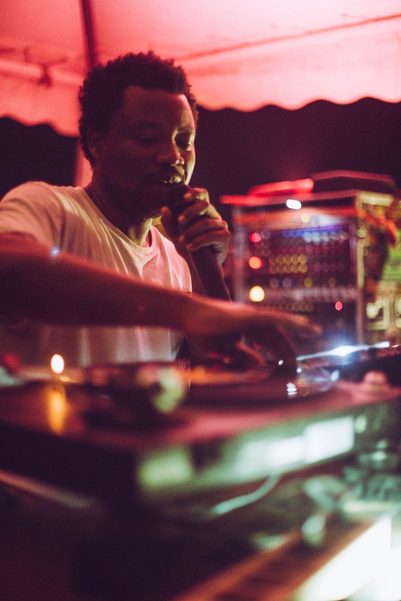
Kebra Ethiopia: Sound as survival and resistance
For two decades, Kebra Ethiopia Sound System, founded by Lekentle Mohlala, has embodied this spirit. Born in the shadow of Apartheid’s restrictions on gatherings, Kebra Ethiopia became a defiant space in Johannesburg, South-Africa for connection and resilience. Despite ongoing battles with poverty and systemic challenges, Lekentle has kept his sound alive. Fuelled, as he says, by reggae itself: 'Many are people who might be in trouble: criminals, or struggling with substances. When they come to my sessions however, they feel at home. They don’t need to solve everything at once.'
He explains how they become part of the community. They see people like them, understand it’s not personal, but the system. Lekentle Mohlala: 'We are all in the same struggle. And that helps them choose a better path.'
He chooses to remain in the area that needs it most rather than re-locating, prioritising organic growth and community care over the promise of bigger audiences or greater financial reward elsewhere. For Lekentle, the decision is not just practical, but deeply political: a commitment to making music a resource for the people around him.
'We keep our base here by choice. Because for us, reggae and sound system are resources for those who are disadvantaged. Uptown, sure, we could do better, but it wouldn’t serve the same purpose. Here, it brings people together.'
'Suffering looks different, but music accommodates everyone'
In a community where people have to choose between food and entertainment, he makes the gathering into a place where you don’t have to choose, providing food for those who need it, and providing the sound to help people connect. On ADE Thursday at Garage Noord, Mohlala will step into new territory, performing on the Dutch Covenant Sound system in an enclosed venue, a stark contrast to the outdoor sessions he is used to hosting back home. For him, the shift in setting doesn’t change the mission: 'I’ve seen it everywhere - Brazil, Europe - suffering looks different, but music accommodates everyone. It welcomes everyone.'
Then, on Saturday at Felix Meritis, he will speak alongside Ethel Leka and others, presenting a short film exploring his past, and discuss how sound systems serve as tools of resistance, shaping both local communities and the global music landscape.
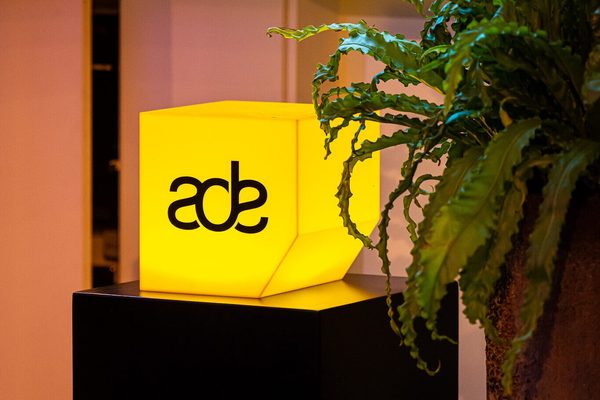
People made metal
Sound system culture has spread globally since its genesis in Jamaica in the 1950’s, typified by London's Notting Hill Carnival, which celebrates and reclaims the space that the windrush generation lost to gentrification. Its symbol as resistance to colonialism, and as an expression of anguish and resistance lives on, and is an important part of the underground music scene across the world, owing the crossover to speakers being rented out to free parties in the 90s, with reggae giving rise to dub, drum and bass and jungle. They are much more than just speakers and chords, they are living communities, churned out by the environment that they are built in, and are able to survive due to the passion and dedication of those around them. It is people, made metal.
Few embody this more than Linett Kamala, who first played Notting Hill Carnival at age 15. That moment of courage set her on a path as a multidisciplinary artist (LIN KAM ART), board member of Notting Hill Carnival, and founder of the Sound System Futures program, now in its fourth year of mentoring the next generation.
The science behind music
Science backs what the culture has known for a long time, lower frequencies heal because humans evolved to feel low vibrations as signals of safety, presence, and connection. As the bass fills the body and reverberates within, the vocals of reggae deliver messages of hope and resilience.
Linett Kamala takes the message from the music into her life. Bringing compassion and care into a male-dominated industry often marked by hyper-masculine competition, she provides equal care to all parts of the sound spectrum. The highs and the lows, with her ears intact despite being constantly surrounded by noise, she can hear the messages in the music and feel the healing of the bass. ‘I don’t clash. I bring care with my sound system. I don’t compete. I bring collaboration. And I bring compassion.’
The 'Sound System Queen' is determined to spread that message throughout the world, priding herself on her ‘other life’ as a teacher, and will be landing in Amsterdam for ADE, where she will host a session called Sound System Culture as a Force for Healing. She brings with her the same discipline and care that shapes her artistry, passing those values on to others and nurturing the next generation.
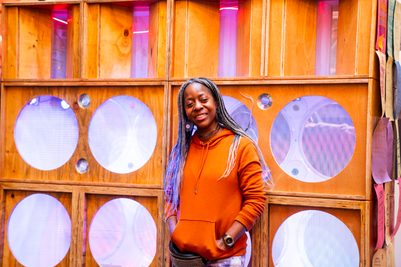
People made metal
Sound system culture has spread globally since its genesis in Jamaica in the 1950’s, typified by London's Notting Hill Carnival, which celebrates and reclaims the space that the windrush generation lost to gentrification. Its symbol as resistance to colonialism, and as an expression of anguish and resistance lives on, and is an important part of the underground music scene across the world, owing the crossover to speakers being rented out to free parties in the 90s, with reggae giving rise to dub, drum and bass and jungle. They are much more than just speakers and chords, they are living communities, churned out by the environment that they are built in, and are able to survive due to the passion and dedication of those around them. It is people, made metal.
Few embody this more than Linett Kamala, who first played Notting Hill Carnival at age 15. That moment of courage set her on a path as a multidisciplinary artist (LIN KAM ART), board member of Notting Hill Carnival, and founder of the Sound System Futures program, now in its fourth year of mentoring the next generation.
The science behind music
Science backs what the culture has known for a long time, lower frequencies heal because humans evolved to feel low vibrations as signals of safety, presence, and connection. As the bass fills the body and reverberates within, the vocals of reggae deliver messages of hope and resilience.
Linett Kamala takes the message from the music into her life. Bringing compassion and care into a male-dominated industry often marked by hyper-masculine competition, she provides equal care to all parts of the sound spectrum. The highs and the lows, with her ears intact despite being constantly surrounded by noise, she can hear the messages in the music and feel the healing of the bass. ‘I don’t clash. I bring care with my sound system. I don’t compete. I bring collaboration. And I bring compassion.’
The 'Sound System Queen' is determined to spread that message throughout the world, priding herself on her ‘other life’ as a teacher, and will be landing in Amsterdam for ADE, where she will host a session called Sound System Culture as a Force for Healing. She brings with her the same discipline and care that shapes her artistry, passing those values on to others and nurturing the next generation.
At ADE, Sound System Culture stands not only as a celebration of music but also as a reminder of its roots. It was born in response to trauma, whether under Apartheid, Colonialism, or the many other systemic pressures communities still face. Sound systems are more than amplifiers; they are lifelines. Without such spaces, society risks further fragmentation. With them, we find connection, resistance, and the possibility of healing.